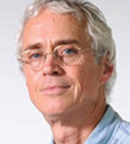
Douglas Hanahan, PhD
Ludwig Cancer Research has announced the appointment of Douglas Hanahan, PhD, as a Distinguished Scholar at the Lausanne Branch of the Ludwig Institute for Cancer Research. A molecular biologist and cancer researcher, Dr. Hanahan has made several seminal discoveries in cancer biology and immunology over the course of his career.
While still a Harvard graduate student working at the Cold Spring Harbor Laboratory in New York in the 1970s, Dr. Hanahan developed new and more efficient methods for gene cloning and bacterial genetic engineering. After earning his PhD, Dr. Hanahan stayed on at Cold Spring Harbor and, by the late 1980s, had developed one of the first mouse models engineered to develop cancers in specific organs. He went on to use these models to examine the stages by which precancerous cells progress to invasive malignancies, the role cancer genes play in this transformation, and the immune system’s response to cells bearing novel mutations associated with cancers.
‘Angiogenic Switch’
In collaboration with the late Judah Folkman, MD, in these mouse models, Dr. Hanahan identified the “angiogenic switch.” He and Dr. -Folkman subsequently explored the pharmacologic inhibition of the switch, work that ultimately contributed to the development of antiangiogenic drugs for cancer therapy.
Dr. Hanahan is also noted for his coauthorship with Ludwig MIT Director Robert Weinberg of The Hallmarks of Cancer, a perspective on cancer biology published in Cell in 2000, as well as an update the pair published in the journal in 2011. Their essay drew from all corners of the sprawling field of cancer biology to create a unifying conceptual framework for understanding tumor initiation and progression, identifying a handful of capabilities cells must acquire to become malignant.
Dr. Hanahan’s lab continues to unravel the stages and drivers of tumor progression and investigate pharmacologic strategies to disrupt each step of the process. It also explores how the tumor microenvironment contributes to drug resistance, with a focus on its role in thwarting immune clearance.

